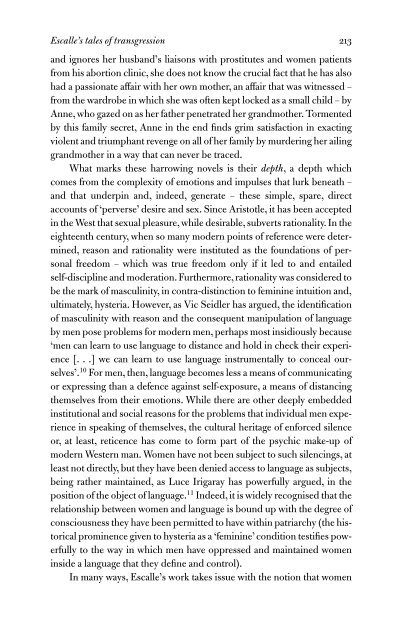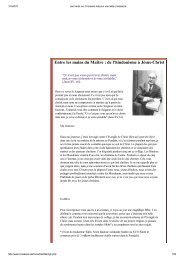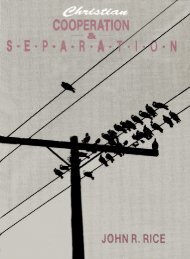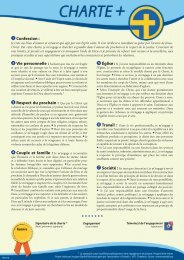Women writing in contemporary France
You also want an ePaper? Increase the reach of your titles
YUMPU automatically turns print PDFs into web optimized ePapers that Google loves.
Escalle’s tales of transgression 213<br />
and ignores her husband’s liaisons with prostitutes and women patients<br />
from his abortion cl<strong>in</strong>ic, she does not know the crucial fact that he has also<br />
had a passionate affair with her own mother, an affair that was witnessed –<br />
from the wardrobe <strong>in</strong> which she was often kept locked as a small child – by<br />
Anne, who gazed on as her father penetrated her grandmother. Tormented<br />
by this family secret, Anne <strong>in</strong> the end f<strong>in</strong>ds grim satisfaction <strong>in</strong> exact<strong>in</strong>g<br />
violent and triumphant revenge on all of her family by murder<strong>in</strong>g her ail<strong>in</strong>g<br />
grandmother <strong>in</strong> a way that can never be traced.<br />
What marks these harrow<strong>in</strong>g novels is their depth, a depth which<br />
comes from the complexity of emotions and impulses that lurk beneath –<br />
and that underp<strong>in</strong> and, <strong>in</strong>deed, generate – these simple, spare, direct<br />
accounts of ‘perverse’ desire and sex. S<strong>in</strong>ce Aristotle, it has been accepted<br />
<strong>in</strong> the West that sexual pleasure, while desirable, subverts rationality. In the<br />
eighteenth century, when so many modern po<strong>in</strong>ts of reference were determ<strong>in</strong>ed,<br />
reason and rationality were <strong>in</strong>stituted as the foundations of personal<br />
freedom – which was true freedom only if it led to and entailed<br />
self-discipl<strong>in</strong>e and moderation. Furthermore, rationality was considered to<br />
be the mark of mascul<strong>in</strong>ity, <strong>in</strong> contra-dist<strong>in</strong>ction to fem<strong>in</strong><strong>in</strong>e <strong>in</strong>tuition and,<br />
ultimately, hysteria. However, as Vic Seidler has argued, the identification<br />
of mascul<strong>in</strong>ity with reason and the consequent manipulation of language<br />
by men pose problems for modern men, perhaps most <strong>in</strong>sidiously because<br />
‘men can learn to use language to distance and hold <strong>in</strong> check their experience<br />
[. . .] we can learn to use language <strong>in</strong>strumentally to conceal ourselves’.<br />
10 For men, then, language becomes less a means of communicat<strong>in</strong>g<br />
or express<strong>in</strong>g than a defence aga<strong>in</strong>st self-exposure, a means of distanc<strong>in</strong>g<br />
themselves from their emotions. While there are other deeply embedded<br />
<strong>in</strong>stitutional and social reasons for the problems that <strong>in</strong>dividual men experience<br />
<strong>in</strong> speak<strong>in</strong>g of themselves, the cultural heritage of enforced silence<br />
or, at least, reticence has come to form part of the psychic make-up of<br />
modern Western man. <strong>Women</strong> have not been subject to such silenc<strong>in</strong>gs, at<br />
least not directly, but they have been denied access to language as subjects,<br />
be<strong>in</strong>g rather ma<strong>in</strong>ta<strong>in</strong>ed, as Luce Irigaray has powerfully argued, <strong>in</strong> the<br />
position of the object of language. 11 Indeed, it is widely recognised that the<br />
relationship between women and language is bound up with the degree of<br />
consciousness they have been permitted to have with<strong>in</strong> patriarchy (the historical<br />
prom<strong>in</strong>ence given to hysteria as a ‘fem<strong>in</strong><strong>in</strong>e’ condition testifies powerfully<br />
to the way <strong>in</strong> which men have oppressed and ma<strong>in</strong>ta<strong>in</strong>ed women<br />
<strong>in</strong>side a language that they def<strong>in</strong>e and control).<br />
In many ways, Escalle’s work takes issue with the notion that women


















